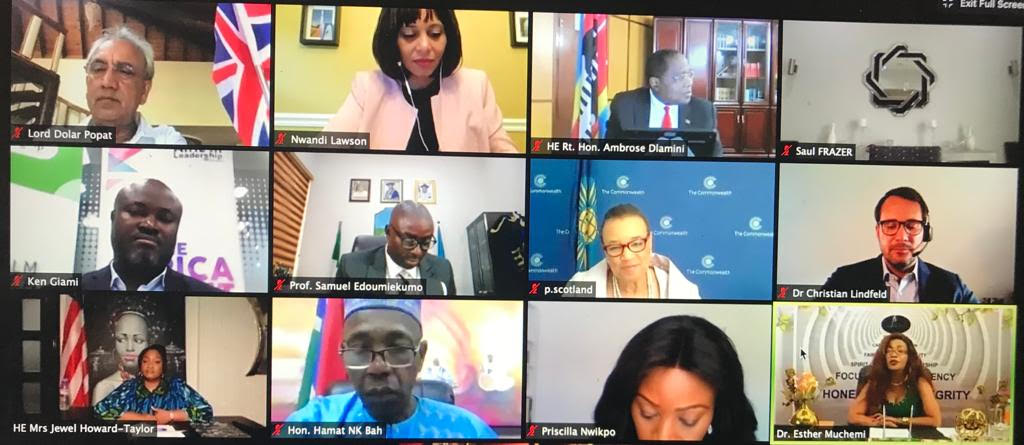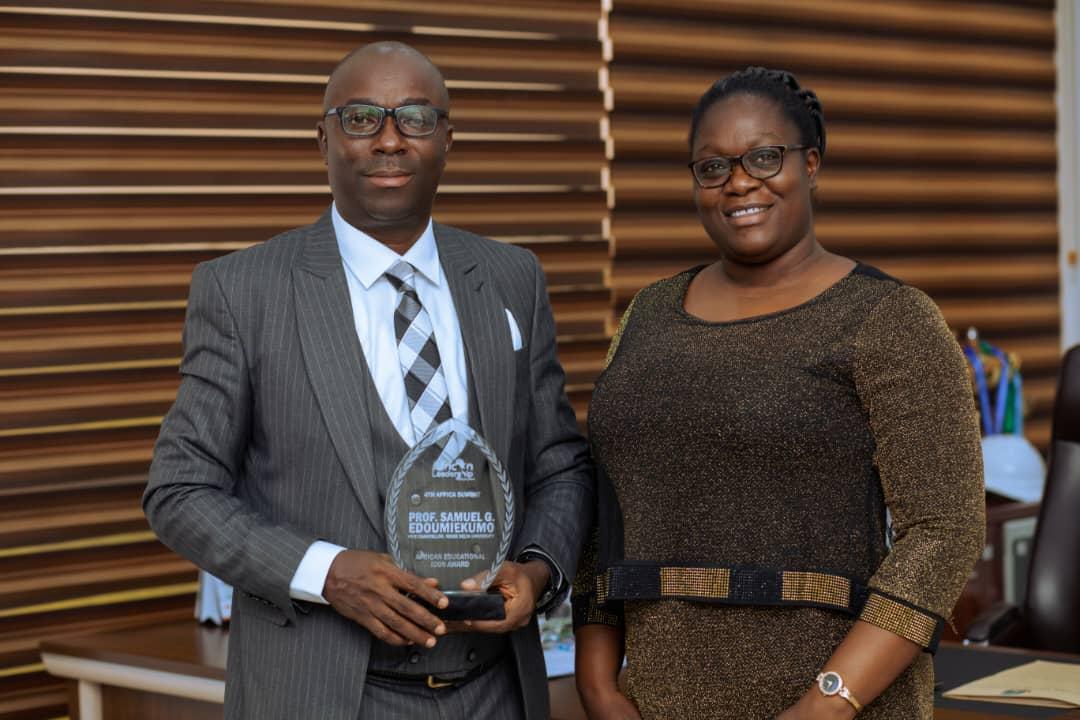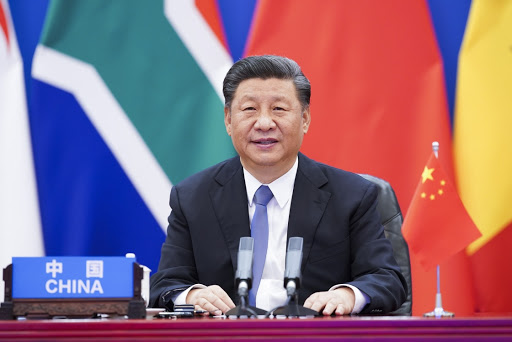By Kingsley Okeke
The Commonwealth Secretary-General, Baroness Patricia Scotland, has said that technology, innovation and trade are keys to Africa’s post-COVID-19 recovery process. She made this known during her keynote speech at the Africa Summit 2020, on Thursday 25 June 2020, organized by the African Leadership Magazine and hosted by the magazine’s publisher and CEO Dr Ken Giami.
According to the Secretary-General, Patricia Scotland, “Technology, Innovation and Trade are vital for tackling and recovering from the current Pandemic.”
The event which is the 4th edition held virtually and also had, His Excellency Rt. Hon. Ambrose Dlamini, Prime Minister of Eswatini, Her Excellency Jewel Howard-Taylor, Vice President of Liberia, Lord Dollar Popat, Member UK House of Lords and UK Prime Minister’s Envoy to Rwanda and Uganda, as speakers.
SG Scotland also said that “as the nations of the Commonwealth and the World work to rebuild infrastructure, the need for inclusiveness and resilience will be of utmost importance. Inclusiveness and resilience have always been the watchword of the Commonwealth. It is also at the centre of the 2030 Sustainable Development Agenda of the United Nations.”
The Secretary-General also maintained that the Africa Free Trade Agreement provides a unique opportunity to leapfrog sustainable trade within the continent.
“The entering into force of the Africa Free Trade Agreement, just over a year ago, continues to offer tremendous opportunities for the countries of the continent to grow trade and investment, including SMEs, she said.”
With the theme COVID-19: Pathways to Africa’s Economic Recovery and Future Growth, the event traditionally holds in London UK, but, held virtually this year due to the COVID-19 disruption. It is part of African Leadership magazine’s response to the debate on resetting Africa’s development priorities post-COVID-19.
Other discussants and panelists at the event include Sen. Manqoba Khumalo, Minister of Commerce & Trade, Kingdom of Eswatini; Hon. Hamat Bah, Minister of Culture & Tourism, The Gambia; Dr Christian Lindfeld, Managing Partner, Africa Advisors GmbH Germany; Dr Victor Oladdokun, Former Director of Communications, African Development Bank; Senyo Hosi, Chairman Ghana Chamber of Bulk Oil Distributors, Saul Frazer, CEO Global Properties, Gambia; and Professor Samuel Edoumiekumo, Dr Esther Muchemi CEO Samchi Group Kenya, among others.

Full text of her Keynote address is as below:
Excellencies, distinguished panellists and forum participants…
It is very good to be addressing you at the opening of this summit with its focus on examining matters of vital concern for Africa and for the wider international community.
Had it not been for the coronavirus pandemic, the leaders and representatives of the Commonwealth family were to have assembled this very week and day in Africa.
Heads of Government of our family of 54 nations, 19 of them from the African region, would have been hosted in Kigali by His Excellency Paul Kagame, President of Rwanda, for the 2020 Commonwealth Heads of Government Meeting – CHOGM as it is more generally known.
That meeting has, of course, had to be postponed.
When circumstances are such that we are able to convene physically, it will I am sure be a CHOGM like none that has ever been held before.
As the nations of the Commonwealth and of the world more widely work to rebuild economic and social fabric and infrastructure, the need for inclusiveness and resilience will be of utmost concern.
Inclusiveness and resilience have long been Commonwealth watchwords.
They are also central to the 2030 Agenda for Sustainable Development.
I believe they are vital considerations as we set out to map Pathways to Africa’s Economic Recovery and Growth, and as we move forward from the massive disruption and dislocation caused by COVID-19.
Our current Commonwealth theme and focus is on Delivering a Common Future: Connecting, Innovating, Transforming – indeed, that was the theme set for the Kigali CHOGM.
Yesterday, to mark the day on which Commonwealth leaders would have been gathering in Kigali, I convened a virtual meeting for our Heads of Government.
Its focus was on our collective response to COVID-19 and to other current social and economic global priorities.
So it is good to be continuing that theme of responding to the COVID pandemic at this Africa Summit today and to look at how by connecting, innovating and transforming, we can deliver a common future for the people of Africa, with economic recovery and growth in which all can share.
The entry into force legally just over a year ago of the African Continental Free Trade Area continues to offer immense promise for countries of the region to grow trade and investment, including among SMEs which are responsible for more than 80% of Africa’s employment and 50% of its GDP.
Technology, trade and innovation are vital for tackling and recovering from the present pandemic, and for rebuilding the economies of our member countries to be more resilient for the future.
With COVID-19 having such far-reaching impacts in the lives of all our countries and communities, immense changes in the way we conduct our personal and business affairs have been necessary.
Some of these are beneficial, and we embrace them for the future, others are certainly less welcome, and in the Commonwealth, we are working together to overcome the need for them.
The accelerated adoption of digital technologies is very positive, and it is encouraging to see how rapidly innovative approaches are transforming our home and work environments, our healthcare systems, and the ways we trade.
By compelling us to adjust to a ‘new normal’, the pandemic has brought home to us the vital importance of trade, technology and innovation to all aspects of our lives and livelihoods.
It has also underlined the urgent need to address digital divides by upgrading infrastructure and updating regulatory frameworks so that businesses and consumers can confidently and competitively engage in trade and commerce.
As economies are reconfigured and recover post-COVID, advances in technology and innovation can open up broad horizons of opportunity to develop new business sectors and to deliver improved services, with enhanced market access.
For example, advanced digital production technologies create new ways to accelerate innovation, boost productivity and increase the value-added content of goods and services.
More generally, the rise of new technologies is already opening up new economic pathways, with livelihoods and job opportunities that support inclusive and sustainable development.
Fintech is immensely important in this regard, and it is an area in which some countries in the African region are already global leaders.
A welcome outcome of the innovation being delivered through fintech is greater financial inclusion and empowerment.
At the Commonwealth Secretariat, in response to the needs of our member countries, we continually develop new approaches and modalities for providing assistance that increases economic diversification.
Our technical experts work to ease and encourage the participation of micro and small businesses in global trade, and more generally to strengthen intra-Commonwealth trade.
We do so because MSMEs, and particularly the energetic and innovative contributions of young entrepreneurs, are the fulcrum for development and growth in any country.
We have learnt very swiftly during the pandemic the immense value of ICT and digital innovations in making possible more remote and virtual ways of interacting, working and doing business.
With global value chains being restructured, with countries increasingly looking to reshoring and regionalization, the WTO estimates global trade could decline by between 13% and 32% in 2020.
The United Nations Conference on Trade and Development estimates global foreign direct investment could plummet by up to 40% this year.
Investment flows into Africa are set to fall by between 25 and 40% in 2020, and the equivalent flows to developing countries in Asia could decline by as much as 45%.
These challenges have heightened the need for technological innovations to reduce barriers to internationalization, to ensure that supply chains remain open, and to support e-commerce and borderless digital trade.
So we must also cooperate on developing the digital skills necessary to operate in the economy of the future.
Digital literacy and confident ICT skills become non-negotiable for the empowerment of women, girls, youths and marginalized populations.
Female-run businesses are predominantly Small Medium Enterprises (SMEs) or Microenterprises (MSMEs), and these have been disproportionately affected by the COVID-19 lockdown measures introduced by governments.
SMEs tend to be connected to sectors such as agriculture and tourism or to their supply chains, and in many countries and communities demand their products and services has been wiped out – together with the livelihoods, security and dignity it brings for many women.
There is a worryingly high risk of long-lasting negative effects on female labour force participation, and the concomitant danger of setting back the progress made towards the empowerment of women and on eliminating gender-based violence.
It is vitally important for such potentially far-reaching social and economic impact to be at the forefront of planning for the reset of our economies.
So let us take encouragement from one another, and be open to lessons which our experience of the pandemic can help us to learn – including the benefits of new ways of connecting, communicating and cooperating.
Above all, let us keep faith with multilateralism – for which the Commonwealth, the African Union and other international and regional groupings continue to shine like beacons.
It is through such commitment and collaboration that we shall be able to chart our way forward post-COVID along pathways towards a common future that is fairer, more sustainable, more secure and more prosperous for all.


